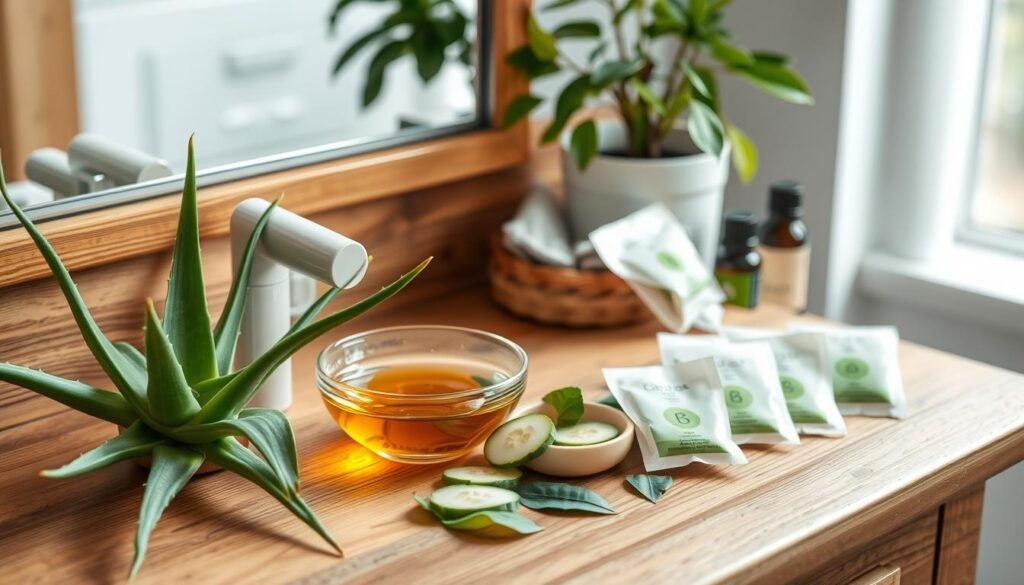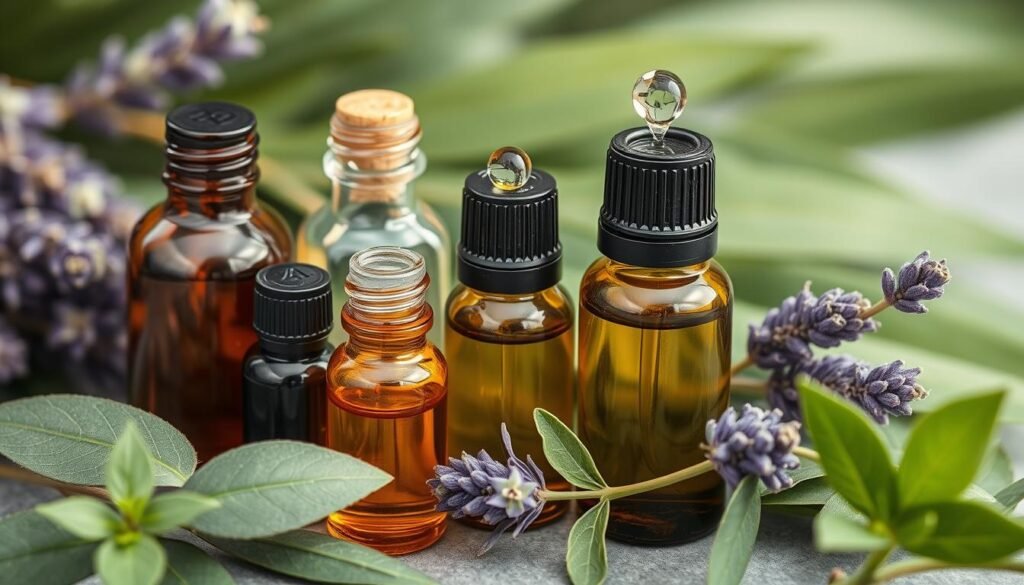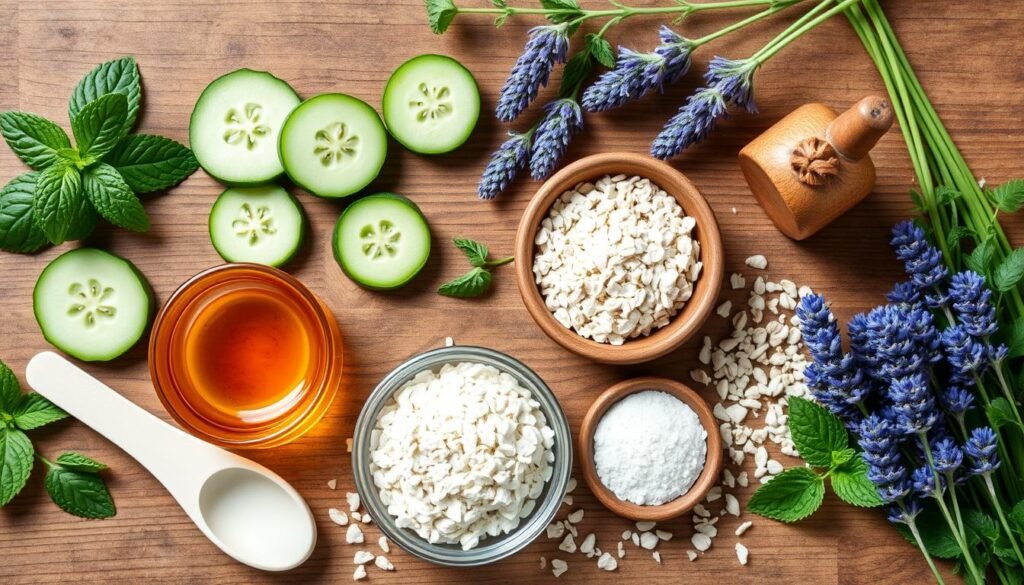Did you know that about 85 percent of young adults deal with acne? It’s a common skin issue that prompts many to seek effective treatments. People often turn to natural solutions rather than traditional methods. This is because products like benzoyl peroxide and salicylic acid can cause unwanted side effects.
For those struggling with forehead acne, there are various home remedies for forehead acne to try. Studies indicate that 77 percent of those with acne have sought alternative treatments. Natural remedies like tea tree oil and aloe vera can help. They aim to balance oil, reduce inflammation, and fight the bacteria that lead to pimples. We will look into several remedies and changes that can improve your skin.
When trying to improve your skin naturally, consulting a dermatologist is key. This is especially true for severe acne cases. A professional can offer personalized advice to avoid scarring and achieve clearer skin. For more information, here is a link to medical insight on forehead acne solutions.
Key Takeaways
- Forehead acne affects a significant percentage of young adults.
- Natural remedies may provide alternatives to conventional acne treatments.
- Effective home remedies include tea tree oil and aloe vera.
- Consulting a dermatologist is crucial for severe cases.
- Adopting lifestyle changes can help prevent future breakouts.
Understanding Forehead Acne
Forehead acne is common, especially during puberty. Hormone surges increase oil production, causing clogged follicles and breakouts. Understanding it means knowing its various forms like whiteheads, blackheads, and cystic acne. Targeted treatments are essential because of this.
Oily hair and styling products can worsen acne. This is known as pomade acne in dermatology. Similarly, conditions like folliculitis or rosacea can look like acne, making diagnosis and treatment hard.
To prevent forehead acne, cleanse your face and hair regularly. Use products that don’t clog pores and keep hair off your forehead. Never pop pimples; it can cause infections and scars.
Lifestyle choices impact acne too. Stress, certain drugs, and genetics can make it worse. Hormones play a big role, too. Treatments include a good skincare routine and natural remedies like tea tree oil and aloe vera.
Causes of Forehead Acne
Understanding causes of forehead acne shows how several factors play a part. Most people, about 85%, will face acne on their forehead. This is often due to genetics and changes in hormones. Androgen hormones, which include testosterone, can make the skin produce more oil. This is especially true during the teen years, leading to clogged pores.
Certain medicines, like steroids and anticonvulsants, can make acne worse in some people. Choices we make in life also matter. For example, smoking and high levels of stress can lead to worse acne. This shows how managing stress can help.
Forehead acne can show up in different ways, like comedonal, inflammatory, or cystic. When dead skin cells and too much oil block pores, various pimples appear. Also, things like wearing hats or not washing pillowcases can trap sweat and oil. This creates a perfect place for bacteria to grow.
Dermatologists say knowing what triggers your acne can help manage it. Keeping your face clean, using light products, and understanding your skin’s needs are important steps. This can help fight off forehead acne.
Home Remedies for Forehead Acne
Looking into home remedies for forehead acne opens up natural, effective options. Simple ingredients can make a big difference in skin health. These methods are great for handling breakouts and boosting overall skin wellness.
Tea Tree Oil as a Natural Solution
Tea tree oil is celebrated for its strong antibacterial and anti-inflammatory traits. It battles the P. acnes bacteria, often linked to acne. By applying diluted tea tree oil, many see a drop in acne lesions. A 2019 review showed its benefits, making it a favored home remedy for forehead acne.
Benefits of Apple Cider Vinegar
Apple cider vinegar tackles acne with its organic acids. These acids are believed to fight off bacteria. Despite limited scientific support, its citric acid might kill P. acnes bacteria. Use caution, though, as it can irritate sensitive skin. When used correctly, it supports acne treatment well.
Application of Aloe Vera
Aloe vera is admired for its soothing and antibacterial qualities. It’s great for easing irritated skin and healing acne. Studies show it can lessen skin bumps and keep skin moisturized. Adding aloe vera gel to your skincare can boost other acne treatments’ success.

| Natural Solution | Benefits | Application Tips |
|---|---|---|
| Tea Tree Oil | Reduces bacteria; Anti-inflammatory | Use diluted (with carrier oil) directly on affected areas |
| Apple Cider Vinegar | Helps combat bacteria; Mild exfoliation | Mix with water and apply with a cotton ball |
| Aloe Vera | Soothes irritation; Promotes healing | Apply fresh gel directly to acne lesions |
For anyone fighting forehead acne, these home remedies can improve your skincare routine. Knowing how to mix these natural solutions helps you take care of your skin. For more advice on spotting and treating acne, check out this informative article.
Using Essential Oils for Acne Control
Essential oils can be a natural way to handle skin blemishes. Some oils have special qualities that fight acne while being kind to your skin. We’ll talk about how jojoba oil and argan oil can help with acne.
Effectiveness of Jojoba Oil
Jojoba oil is popular because it doesn’t clog pores. It moisturizes the skin without causing more acne. People have seen a 54% improvement in their skin after using masks with jojoba oil for a few weeks. So, jojoba oil can be a great part of your acne-fighting plan.
Potential of Argan Oil
Argan oil is also great for skin health. It helps manage oil production, which can prevent blocked pores. It reduces redness and skin irritation from acne. Plus, argan oil hydrates the skin, helping to reduce acne scars. This is especially good for forehead acne.

| Essential Oil | Properties | Benefits for Acne Control |
|---|---|---|
| Jojoba Oil | Noncomedogenic, moisture-retaining | Reduces breakouts, hydrates skin |
| Argan Oil | Anti-inflammatory, regulates sebum | Reduces redness, minimizes scars |
DIY Acne Solutions and Face Masks
Finding DIY acne solutions can make a huge difference in getting clear skin. More and more people are using natural ingredients. They create face masks for acne using the power of nature. Honey, cinnamon, and green tea are famous for their acne-fighting abilities.
Honey and Cinnamon Mask
The honey and cinnamon mask uses honey’s antibacterial properties and cinnamon’s power to reduce inflammation. This mixture targets acne-causing bacteria to help clear your skin. Though research is ongoing, many have seen great results from this mask. Mix two tablespoons of honey with one teaspoon of cinnamon, apply to your face, and wash off after 10-15 minutes.
Green Tea Applications
Green tea is fantastic for fighting acne because it’s full of antioxidants. It reduces oil production and fights inflammation, leading to less acne. To use green tea, brew a bag in hot water, let it cool, and then dab the tea on your skin with a cotton ball. Green tea doesn’t just fight acne—it also rejuvenates your skin. For more on natural remedies, check out key findings from acne studies on the effectiveness of topical treatments.

| Ingredient | Properties | Application |
|---|---|---|
| Honey | Antibacterial, anti-inflammatory | Can be used in masks and spot treatments |
| Cinnamon | Anti-inflammatory | Used in conjunction with honey for face masks |
| Green Tea | Antioxidant, anti-inflammatory | Applied directly to the skin or as a rinse |
Lifestyle Changes to Prevent Breakouts
Making smart lifestyle choices can massively improve your skin’s condition and lessen acne. Our daily habits are key to keeping our skin clear. Including a soft cleansing step in your daily skin care can help get rid of extra oil and dirt.
It’s important not to touch your face often. When you do, you’re moving oil and germs from your hands to your face. This can cause more pimples. Make sure to regularly clean things you often use, like your phone. Working out regularly helps with stress and boosts blood flow, which is good for your skin. Remember to clean your skin well before and after exercising to prevent body acne.
Staying hydrated is critical for a clear complexion. Drinking enough water keeps your skin moist and fights off dryness. This can stop your skin from making too much oil. Using mindfulness, yoga, or meditation to manage stress can help keep your hormone levels even. This can reduce the number of pimples you get.
Finally, using skincare products that don’t block your pores is a smart move. Adding a sunscreen that protects against all types of sunlight with SPF 30 or more can help keep your skin looking and feeling healthy.
| Lifestyle Change | Benefit |
|---|---|
| Regular exercise | Helps manage stress and improves circulation |
| Hydration | Maintains skin moisture and reduces oiliness |
| Avoid touching the face | Prevents transfer of bacteria and oil to skin |
| Consistent daily skincare | Removes excess oil and impurities |
| Use non-comedogenic products | Prevents clogged pores and breakouts |
| Daily sunscreen | Protects skin from UV damage |
Dietary Modifications for Clear Skin
Eating right is key to clear skin. Knowing what to eat and what to skip is crucial. Good nutrition helps your skin and can fight acne triggers.
Importance of Staying Hydrated
Drinking enough water is vital for your skin’s health. It flushes out toxins and keeps skin cells healthy. Drinking plenty helps reduce skin problems like acne.
Everyone should drink water throughout the day. How much you need depends on how active you are and the weather.
Managing Stress Levels
Keeping stress in check is important for skin health. Stress can cause your body to make more oil, which can lead to pimples. Mindfulness, exercise, and good sleep can lower stress.
| Food Type | Impact on Skin Health |
|---|---|
| High Glycemic Foods | Increases sebum production, leading to acne |
| Dairy Products | Potentially worsens acne, particularly cow’s milk |
| Complex Carbohydrates | Reduces acne development, beneficial for skin health |
| Fatty Fish and Nuts | Rich in omega-3s and antioxidants, reduces inflammation |
| Fruits and Vegetables | Provide essential vitamins that improve skin quality |
Conclusion
Managing forehead acne can be simple with the right home remedies and lifestyle changes. Using natural treatments like tea tree oil, aloe vera, and omega-3 fatty acids can make a big difference. It also helps to know what triggers your acne, such as stress or hormonal imbalances.
Each person’s skin reacts differently to treatments. But, sticking to a skincare routine with these natural solutions can improve your skin. It’s important to be patient since skin renewal takes 40 to 56 days. If your acne is severe, getting advice from a dermatologist is a good idea.
To sum up, beating forehead acne can be done with home remedies, a healthy diet, and changes in how you live. By following these steps, you can work towards better skin. Tackling this common issue requires effort, but the results are worth it.